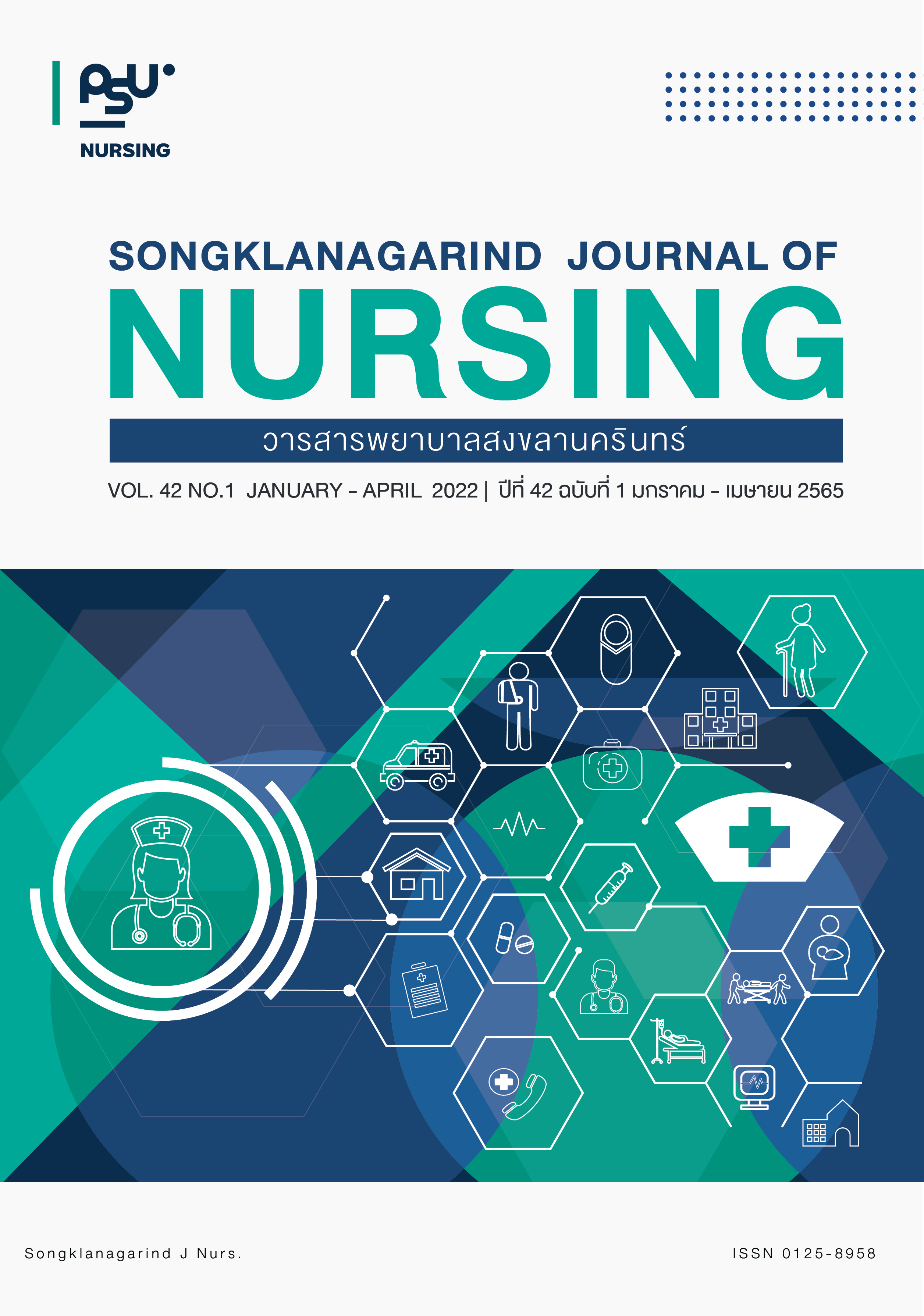ความสัมพันธ์ระหว่างการใช้สื่อออนไลน์กับปัญหาสุขภาพองค์รวมของเด็กวัยเรียนในยุคไทยแลนด์ 4.0
Main Article Content
บทคัดย่อ
วัตถุประสงค์: เพื่อศึกษาความสัมพันธ์ระหว่างการใช้สื่อออนไลน์และปัญหาสุขภาพองค์รวมของเด็กวัยเรียนในยุคไทยแลนด์ 4.0 วิธีการวิจัย: ศึกษาเชิงพรรณนากับกลุ่มตัวอย่างพ่อแม่ของเด็กวัยเรียน จำนวน 122 คน ใช้แบบสอบถามเก็บข้อมูลคุณลักษณะ การใช้สื่อออนไลน์ ปัญหาสุขภาพองค์รวมและรายด้าน ซึ่งมีค่าดัชนีความสอดคล้องมากกว่าหรือเท่ากับ 0.60 ค่าดัชนีความตรงเชิงเนื้อหามากกว่า 0.80 ค่าความเที่ยงสัมประสิทธิ์ครอนบาคแอลฟาในส่วนของการใช้สื่อออนไลน์ เท่ากับ 0.95 และในส่วนของสุขภาพองค์รวมเท่ากับ 0.92 วิเคราะห์ข้อมูลด้วยสถิติเชิงพรรณนา ความถี่ ร้อยละ ค่าเฉลี่ย ค่าเบี่ยงเบนมาตรฐาน และการทดสอบหาค่าสหสัมพันธ์แบบสเปียร์แมน ผลการศึกษา: พบว่าปัญหาสุขภาพองค์รวมอยู่ในระดับปานกลาง ส่วนด้านร่างกายอยู่ในระดับต่ำ ด้านอารมณ์ สังคม และสติปัญญาอยู่ในระดับปานกลาง ประเภทของอินเทอร์เน็ตและระยะเวลาการใช้สื่อออนไลน์มีความสัมพันธ์เชิงบวกกับปัญหาสุขภาพองค์รวม อย่างมีนัยสำคัญทางสถิติ (r = .207, p < .05 และ r = .251, p < .01) ส่วนประเภทของกิจกรรมและอุปกรณ์ที่ใช้สื่อออนไลน์มีความสัมพันธ์ทางลบกับปัญหาสุขภาพองค์รวมอย่างมีนัยสำคัญทางสถิติ (r = -.190, p < .05 และ r = -.204, p < .05) ตามลำดับ และการใช้สื่อออนไลน์มีความสัมพันธ์กับปัญหาสุขภาพรายด้านร่างกาย อารมณ์ สังคม และสติปัญญา อย่างมีนัยสำคัญทางสถิติ (p < .05) สรุป: ประเภทอินเทอร์เน็ต ระยะเวลา กิจกรรมและอุปกรณ์ที่ใช้สื่อออนไลน์มีความสัมพันธ์กับปัญหาสุขภาพองค์รวมและ
รายด้านของเด็กวัยเรียน บุคลากรทางสุขภาพควรตระหนักถึงปัจจัยเหล่านี้เพื่อหาแนวทางป้องกันปัญหาสุขภาพของเด็กวัยเรียนต่อไป
Article Details

อนุญาตภายใต้เงื่อนไข Creative Commons Attribution-NonCommercial-NoDerivatives 4.0 International License.
เอกสารอ้างอิง
Internet World Stats. Usage and population statistics [Internet]. Geneva: Miniwatts Marketing Group; 2021 [cited 2021 Aug 1]. Available from: https://www.internetworldstats.com/stats.htm
Roongsangjun T. Preparedness for the 4th renovation of Thai labor. Journal of Social Work. 2018; 26(2): 172-204. Thai.
Villarejo-Rodríguez MG, Rodríguez-Martín B. A qualitative study of parents’ conceptualizations on fever in children aged 0 to 12 years. Int J Environ Res Public Health. 2019; 16(16): 1-11. doi: 10.3390/ijerph16162959.
Lindvall K, Vaezghasemi M, Feldman I, et al. Feasibility, reliability and validity of the health-related quality of life instrument Child Health Utility 9D (CHU9D) among school-aged children and adolescents in Sweden. Health Qual Life Outcomes. 2021; 19(1): 1-13. doi: 10.1186/s12955-021-01830-9.
Talebnejad MR, Nowroozzadeh MH, Mahdaviazad H, et al. The Shiraz pediatric eye study; A population based survey of school age children: Rationale, design and baseline characteristics. J Ophthalmic Vis Res. 2018; 13(3): 293-300. doi: 10.4103/jovr.jovr_246_17.
Srivichai C. Health behavior in game addiction of early adolescents: A Planned Behavior Theory. JOPN. 2014; 6(2): 1-15. Thai.
Research and Consultancy institute. A complete study report: project to explore behavior and trends of Thai media consumption. Bangkok: Thammasat University; 2019. Thai.
Electronic Transactions Development Agency. Thailand Internet user behavior 2020 [Internet]. Bangkok: ETDA; 2020 [cited 2021 Aug 1]. Available from: http://www.etda.or.th/th/newsevents/pr-news/ETDA-released-IUB-2020.aspx
Bonnaire C, Phan O. Relationships between parental attitudes, family functioning and Internet gaming disorder in adolescents attending school. Psychiatry Research. 2017; 255: 104-10. doi: 10.1016/j.psychres.2017.05.030.
Mersereau M. Universal and non-excludable broadband internet access: A modest proposal for municipal provisioning of broadband as a basic service. Can J Urban Res. 2021; 30(1): 30-9.
George RJ, Menon SA, Sahu C, et al. Level of holistic health & wellness and its percieved influencing factors among baccalaureate nursing students: A mixed approach. Int J Nurs Educ. 2020; 12(3): 35-42. doi: 10.37506/ijone.v12i3.9718.
Ercan S, Acar HT, Arslan E, et al. Effect of Internet addiction on sleep quality, physical activity and cognitive status among university students. J Turkish Sleep Med. 2021; 8(1): 49-56. doi: 10.4274/jtsm.galenos.2021.96158.
Kiatrungrit K, Tapruk K, Ho P, et al. Interesting topic: Internet gaming disorder, Department of Psychiatry Ramathibodi Hospital [Internet]. Bangkok: Mahidol University; 2014 [cited 2021 Aug 1]. Available from: https://med.mahidol.ac.th/ramamental/sites/default/files/public/pdf/Internet%20gaming%20addiction.pdf
Srivichai C. The effect of game addiction in early adolescent. How effect to them. Journal of Public Health Nursing. 2015; 29(1): 157-64. Thai.
Chuesathapanasiri T. Transmedia story-telling. JCIN. 2015; 2(1): 59-88. Thai.
Stein MA, Mendelsohn J, Obermeyer WH, et al. Sleep and behavior problems in school-aged children. Pediatrics. 2017; 107(4): 1-9. doi: 10.1542/peds.107.4.e60.
Wonginchan A, Thanatteerakul C, Suearam K, et al. The school-age children with fears and phobias. Journal of Nursing Science & Health. 2021; 44(2): 11-23. Thai.
Cheng L, Duan M, Mao X, et al. The effect of digital health technologies on managing symptoms across pediatric cancer continuum: A systematic review. Int J Nurs Sci. 2021; 8(1): 22-9. doi: 10.1016/j.ijnss.2020.10.002.
Ying CY, Maria Awaluddin S, Kuay LK, et al. Association of internet addiction with adolescents’ lifestyle: A national school-based survey. Int J Environ Res Public Health. 2021; 18(1): 1-13. doi: 10.3390/ijerph18010168.
Lopez-Fernandez O. Emerging health and education issues related to internet technologies and addictive problems. Int
J Environ Res Public Health. 2021; 18(1): 1-19. doi: 10.3390/ijerph18010321.
Gómez-Zúñiga B, Pulido R, Pousada M, et al. The role of parent/caregiver with children affected by rare diseases: Navigating between love and fear. Int J Environ Res Public Health. 2021; 18(7): doi: 10.3390/ijerph18073724.
Sawyer AG, Ball AD. Statistical power and effect size in marketing research. J Mark Res. 1981; 18(3): 275. doi: 10.2307/3150969.
Srisatidnarakul B. The methodology in nursing research. 5th ed. Bangkok: Chulalongkorn University; 2010. 584 p. Thai.
Srisatidnarakul B. Development and validation of research Instruments: psychometric properties. Bangkok: Chulalongkorn University; 2012. 463 p. Thai.
Vanichbuncha K, Vanichbuncha T. Using SPSS for windows to analyze data. 31th ed. Bangkok: Chulalongkorn University; 2019. Thai.
McDonald A, Holttum S, Drey NSJ. Primary-schoolbased art therapy: exploratory study of changes in children’s social, emotional and mental health. Int J Art Ther Inscape. 2019; 24(3): 125-38. doi: 10.1080/17454832.2019.1634115.
Kim EJ, Namkoong K, Ku T, et al. The relationship between online game addiction and aggression, self- control and narcissistic personality traits. European Psychiatry. 2008; 23(3): 212-18.
Hanpatchaiyakul K, Butudom A, Udmuangpia T, et al. Game addiction behavior and Impacts of game addiction in secondary and high school students in Khon Kaen Municipality. RHPC9Journal. 2021; 15(38): 561-73. Thai.
Aydermir H, Cinar M, Karali Y. Analysis of Internet Addiction Levels of Primary School, Secondary School and High School Senior Students. Int Online J Educ Sci. 2021; 13(4): 1152-178. doi: 10.15345/iojes.2021.04.014.
Koon-aree S, Pukdeepin P, Sangmanee W. Effect of information education via a comic book on anxiety of school-aged children undergoing a cardiac catheterization. Songklanagarind J Nurs. 2015; 35(2): 129-42. Thai.
Ying CY, Maria Awaluddin S, Kuay LK, et al. Association of internet addiction with adolescents’ lifestyle: A national school-based survey. Int J Environ Res Public Health. 2021; 18(1): 1-13. doi: 10.3390/ijerph18010168.
McMullan M. Patients using the Internet to obtain health information: How this affects the patient-health professional relationship. Patient Educ Couns. 2006; 63(1-2): 24-8. doi: 10.1016/j.pec.2005.10.006.
Habibi A, Danesh P, Mazandarani MJZ. The relationship of family function with internet addiction among girl high school students in Malard. MJSS. 2015; 6(4): 215-22. doi: 10.5901/mjss.2015.v6n4s3p215.


